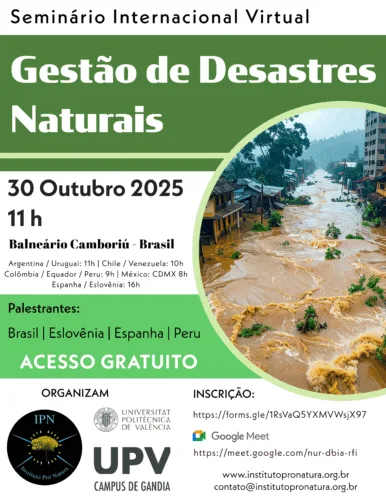On October 30, the International Virtual Seminar on Natural Disaster Management was held, organized by the Pró Natura Institute (IPN) in Balneário Camboriú, Brazil, with the collaboration of the Gandía Campus of the Polytechnic University of Valencia.
The seminar addressed natural disaster management from different academic, professional, and geographical perspectives. The president of the Instituto Pro-Natura (IPN) welcomed the attendees and emphasized the need and importance of addressing natural disaster management from a professional and scientific perspective. Professor LLuís Miret highlighted the importance of events such as this one, which bring together experts from different countries on two different continents and allow them to learn about and share experiences on how to improve the management of a common problem.
Engineer José Manuel Boggio Luna, president of the Advisory Committee of the Tumbes Departmental Council of the College of Engineers of Peru, gave a lecture entitled “Natural Disasters in the Tumbes Region, Peru: El Niño Phenomenon.” The engineer reviewed various environmental tragedies that have affected this region of northern Peru in recent years, all of which are associated with the phenomenon known as El Niño. He emphasized the problems and challenges that each of these episodes has entailed and the lack of actions and infrastructure to solve or at least mitigate the consequences of these phenomena.
For his part, Elton Cunha, coordinator of the Civil Defense Sectoral Chamber of the Regional Administration Council of Santa Catarina – CRA/SC, Brazil, gave a lecture entitled “Between the past and the future of disasters: Rio Grande do Sul and Santa Catarina, Brazil.” In this case, the expert pointed out different disasters that have occurred in southern Brazil and analyzed the response, emphasizing once again the prevention of these disasters. Elton pointed out the paradox that everyone values those who participate in rescues very positively, but that there is strong resistance towards those who try to prevent them. He emphasized the need to work on a culture of prevention.

Jana Breznik, researcher and teaching assistant at the Faculty of Civil and Geodetic Engineering at the University of Ljubljana, Slovenia, gave a lecture entitled “Technological solutions for water dynamics and flood risk reduction.” The lecture covered topics that the professor researches related to spatial planning, GIS analysis, and remote sensing, but applied to natural disaster prevention and management. Specifically, it analyzed the role that satellite image processing can play, for example, those received from the Sentinel-1 satellite, which can play a key role in risk assessment and flood response planning.
Finally, Germán Llorca Abad, professor at the Gandia Campus of the Polytechnic University of Valencia, gave a lecture entitled Impact of communications on the DANA 2024 in Valencia, Spain. In his presentation, he addressed the issue of communication management in a specific natural disaster such as the DANA in Valencia, highlighting how social media and alternative communication sources played a key role in spreading rumors and fake news, which partly hampered disaster management. He also critically analyzed the role played by traditional media and different administrations. He expressed the need to have an official spokesperson to channel information in such tragic events.
The speakers, together with other participants, analyzed disaster management and the importance of multidisciplinary and transnational collaboration, recognizing that disasters are no longer considered “natural” phenomena and require social co-responsibility.
This international event transcended borders, provided insight into Ibero-American experiences, and served as a means of transferring knowledge on the important topic of disaster and natural event management, with a focus on prevention and impact reduction in different societies.

